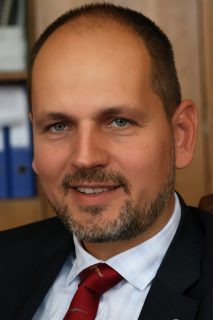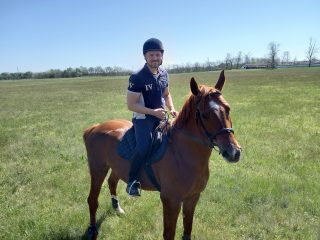Not everybody is a vet, even in a veterinary university… UVMB’s Secretary General is a lawyer and economist. As a recurring element of his career so far, he’s always been a bit of an outsider in the communities he’s been a part of. He was a member of the Reformed Church in the predominantly Catholic town of Kalocsa and, despite coming from a special mathematics class at high school, he applied to study law at the university. However, none of these situations made him feel like a “misfit”. On the contrary, he saw an opportunity in having a different attitude to the mainstream, which can contribute to the community’s success. He thinks being involved in the UVMB’s transition into an independent institution is the challenge of a lifetime. Here’s an extract of our interview with him.
GUSZTÁV BALÁZS
– When I was preparing for this conversation, I kept thinking about why one would want to become a lawyer. I came to the conclusion that lawyers might see social progress as a series of legal cases…
– … You might be right, but my personal motivation was more simple: as a little child attending my aunt’s inauguration, I was fascinated by the professors in their long, coloured robes. As far as the core of the profession is concerned, I am very interested in human relations.
– My family’s past was characterized by medicine, agriculture and the love for nature as well. My paternal grandfather was a head paediatrician. He survived the siege of Budapest as a member of the university combat battalion the veterinarian heroes of which we commemorate every year. My maternal grandfather wanted to be a vet, but history happened: labelled as a kulak (a politically unreliable wealthy peasant according to the Communists), he was taken to forced labour and then drafted to the army. When the conditions became easier, he graduated from the agricultural secondary school in Székesfehérvár, and later on became the chief agronomist of a Kalocsa collective farm. We had a close relationship, I often walked the lands with him, looking at the growing crops and the animal farms. As another legacy from him, I practised his Protestant religion as one of the 80 Reformed Church members surrounded by nearly 20 thousand Catholics.
– Yet you chose a career in law.
– A school friend and I had spent over 18 months preparing for the entrance exam, and we started studying in the faculty of law in Szeged in 1995. He became a full-time student while I was admitted to the part-time programme launched in cooperation with the Károli Gáspár University of the Reformed Church. Although I wasn’t happy about it at the time, it actually turned out well for me because I found two great friends and the law of the Reformed Church was taught at the highest level in this institution. Then I transferred from here to the full-time programme in Pécs. I’ve always been interested in the operation, the general and financial management of large organizations. At first, I worked for the owner of a Hungarian company group, and I got involved in all kinds of cases ranging from regulatory affairs, civil lawsuits, negotiations with banks, property development projects, industrial trade unions, event organization to tender applications. I soon realized, especially when it came to writing bids for tender that there was still a loose end: I needed to study economics. I enrolled in Szeged University’s law-economics graduate programme, and I could use that knowledge in the defence of my PhD thesis last year as well.
– How did you end up in higher education?
– By accident. When I got married and our children were born (my son is 12 and my daughter is 10 already), we were looking for a new place to live and we chose the town of Gödöllő. To be able to spend as much time with my family as possible, I was looking for employment locally and I applied for a job in the Secretary General’s Office of then St. Stephen University (SZIE). Beside my job, I began my doctoral studies under the supervision of Professor István Szűcs and Associate Professor Miklós Marosán in SZIE’s Doctoral School of Management and Business Administration.
– Meanwhile, you were heading towards the next change…
– In his Dean’s programme, Professor Dr. Péter Sótonyi was fighting for regaining the UVMB’s independence. His relentless dedication to this cause, coupled with the current higher education trends of operators urging for increased competitiveness and higher international ranking, created a favourable situation for the process, which was reinforced by the international accreditation requirements of the European Association of Establishments for Veterinary Education (EAEVE). I joined the cause on the Professor’s request. During the preparations back in Gödöllő, the Legal Office was established in István Street, where we laid out the founding charter, the institutional rules and the secession agreement as well as managed the procedure with the operator ministry.
– What are your tasks as Secretary General?
– The Secretary General supports the Rector’s work in terms of management, legal and administrative affairs. This involves supervising the activities of the Rector’s Office, the mailing and filing systems, the coordination of legal affairs, the management of tasks related to the model change, the interactions with the ministry and the operator foundation as well as the lawful and efficient operation of the Senate and the Senate committees. The Secretary General also deals with PR, communication, IT and security affairs.
– You even got a taste of “veterinary work”, can you tell us about it?
– Once I acted as a “surgical assistant” when our own Guinea pig was operated on. We adopted him and his sister two years ago through the Hungarian Guinea-Pig Rescue Association. Ever since, the two siblings have served the purposes of science and education in several ways at the university – their diagnostic and lab results were included in a publication and they also participated in the making of the propedeutics video for online education (by the way, they behaved quite badly during filming, they failed to live up to the reputation of Guinea pigs).
– Do you have a favourite place at the University?
– I love the park when the magnolias are in blossom. I also love Üllő, as it’s an excellent terrain for horse riding. I began riding at the age of fifteen. As a matter of fact, I didn’t go on purpose, I just escorted my little sister there and I sat on a horse, too. Later on I worked in stables during the school holiday, I practised riding alone and in a class, too. With some breaks in between, I’ve been sitting in the saddle ever since. But it always remained a hobby, I’ve never ridden in competitions.
I feel I fit into this academic and veterinary environment, since I am keen on nature, animals and hunting.
– How do you envision the University’s future?
– When it comes to the future of a 235-year-old institution, you must speak with humility and respect, since the UVMB’s bricks have been stacked on top of one another by many generations. I think the key factor is to set the right goals, because universities cannot survive without a potential for constant growth and improvement in international comparison. I see the present situation as an opportunity which, if we use it wisely, can help us rise among the world’s leading institutions.


